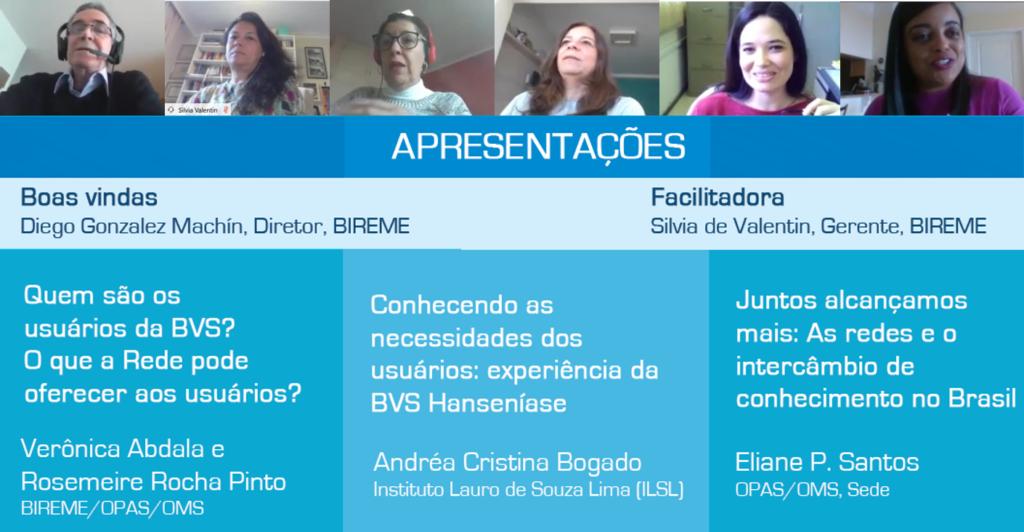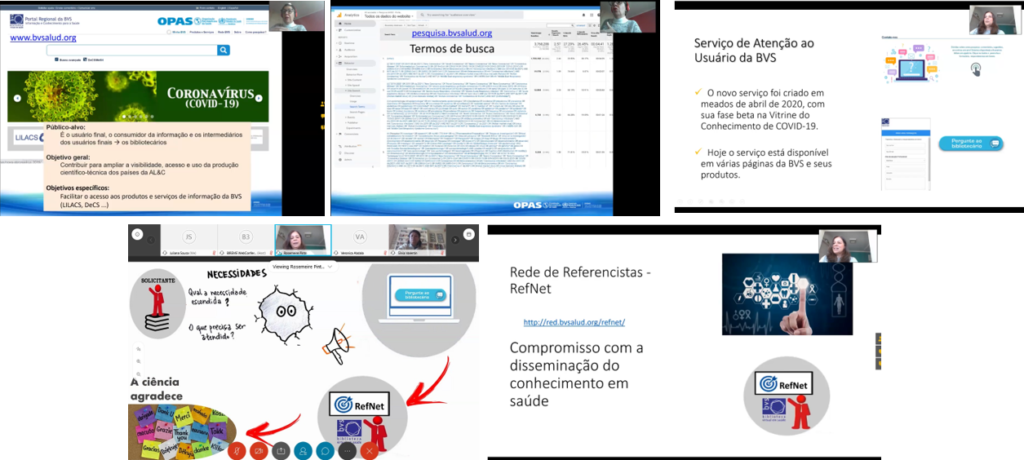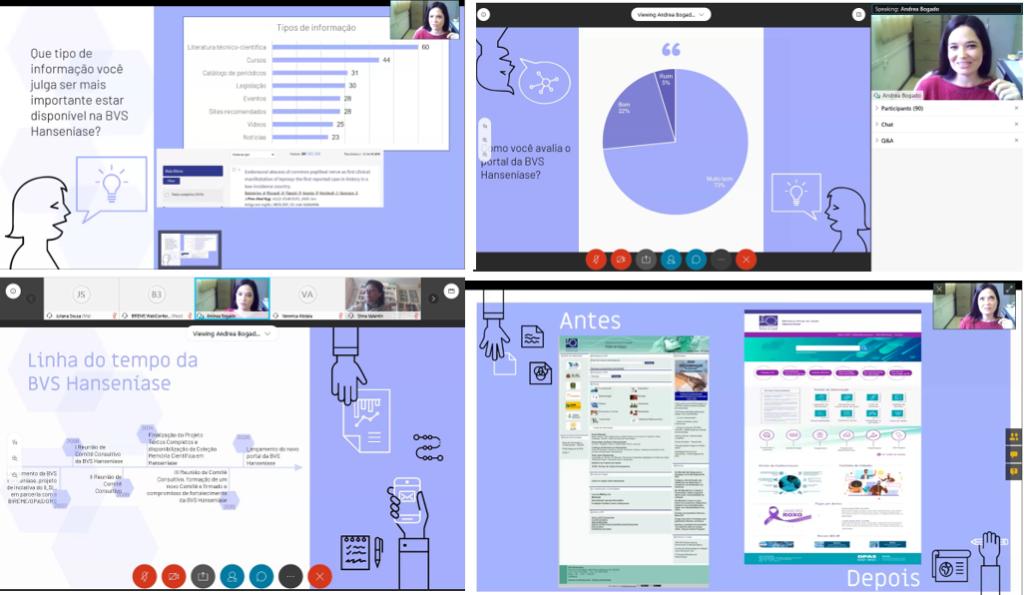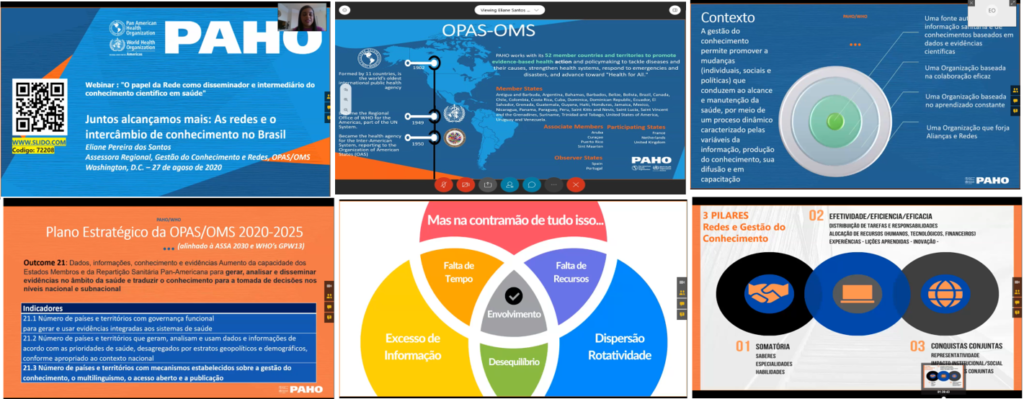Another successful event in the series of webinars to strengthen the Health Information Networks – BiblioSUS and VHL Brazil – took place on August 27 and was attended by 90 participants. There were three presentations that highlighted different points of view and experiences on the theme: “The Network’s role as a disseminator and intermediary of health scientific knowledge“.
 The first presentation featured two speakers representing BIREME/PAHO/WHO. With the eyes of the information user, Veronica Abdala, Information Sources Manager, made a reflection on who the users of the Virtual Health Library (VHL) are, what they seek, what their information needs are and how satisfied they are. with the VHL services and products. There were more questions than answers that left us with an alert: the user is unique and so he wants to be treated and considered. The numbers and data are important to assess how far the VHL is reaching and what is being accessed by users, but they do not express their satisfaction and needs.
The first presentation featured two speakers representing BIREME/PAHO/WHO. With the eyes of the information user, Veronica Abdala, Information Sources Manager, made a reflection on who the users of the Virtual Health Library (VHL) are, what they seek, what their information needs are and how satisfied they are. with the VHL services and products. There were more questions than answers that left us with an alert: the user is unique and so he wants to be treated and considered. The numbers and data are important to assess how far the VHL is reaching and what is being accessed by users, but they do not express their satisfaction and needs.
 With the librarian’s eye, Rosemeire Rocha Pinto, User Services Supervisor, presented the experience of the Referencers Network relating to the reference service of a physical library, that is, where the user goes when he needs help. In the VHL Regional Portal, this service is encapsulated, mainly, in the “Ask the Librarian” service and in the network of professionals specialized in bibliographic searches and user care: the Referencers Network, which was recently constituted by librarians from Brazil, at first. The service “MyVHL” was also mentioned, as the user’s space that has already accumulated an important amount of information about each user, what they are looking for in the VHL, their topics of interest, etc. Surely, MyVHL is a very rich source of information to be explored in order to learn a little more about VHL users.
With the librarian’s eye, Rosemeire Rocha Pinto, User Services Supervisor, presented the experience of the Referencers Network relating to the reference service of a physical library, that is, where the user goes when he needs help. In the VHL Regional Portal, this service is encapsulated, mainly, in the “Ask the Librarian” service and in the network of professionals specialized in bibliographic searches and user care: the Referencers Network, which was recently constituted by librarians from Brazil, at first. The service “MyVHL” was also mentioned, as the user’s space that has already accumulated an important amount of information about each user, what they are looking for in the VHL, their topics of interest, etc. Surely, MyVHL is a very rich source of information to be explored in order to learn a little more about VHL users.
Another aspect to be highlighted, although not presented in the webinar, is the importance of assessing the impact of the VHL services and products from the point of view of its users. The Impact Measurement, in the initial phase of implementation at BIREME, led by Renato Murasaki, Manager of Methodologies and Information Technologies, goes exactly in this direction and that in the short term will bring us input on the degree of satisfaction of VHL users and on the impact information made available and accessed by its different users.
To present an example of “listening to the user”, Andrea Cristina Bogado, librarian at the Instituto Lauro de Sousa Lima and on the occasion representing the Executive Secretariat of the Hansen’s disease VHL, reported a research experience with the users of the VHL Hansen’s disease whose main purpose was to identify users’ needs and to know their evaluation regarding the contents and services offered by the VHL Hansen’s disease, in addition to other aspects related to the VHL portal. The results of this research were considered to define a new information architecture and reformulation of the entire VHL Leprosy Portal and brought the VHL user closer. The new Hansen’s disease VHL website is online and reflects the manifestation of users participating in the research.
 Focusing on some of the main concepts for effective networking, Eliane Pereira dos Santos, Regional Advisor on Knowledge Management and Networks at the Department of Evidence and Intelligence for Action in Health (EIH), told the history of the Organization’s work making a connection between knowledge management and networking, and the positioning of these themes in the PAHO/WHO Strategic Plan 2020-2025. In her presentation entitled “Together we achieve more: networks and knowledge exchange in Brazil”, she highlighted the importance of the diversity of knowledge and skills, and the efficiency and effectiveness that can be achieved with the power of networking. In addition, he emphasized that the achievements of networking should be shared and that even if a moderator is absent, he should not be the one responsible for the Network’s activities. “From networking, our capacity and productivity increase, we learn from mistakes and share experiences”, Eliane emphasized. Finally, he highlighted his satisfaction in being able to revisit the friends of the BiblioSUS and VHL Brazil networks, as well as some of the main developments of the EIH Department with the participation of BIREME, such as the Global Library Group Network.
Focusing on some of the main concepts for effective networking, Eliane Pereira dos Santos, Regional Advisor on Knowledge Management and Networks at the Department of Evidence and Intelligence for Action in Health (EIH), told the history of the Organization’s work making a connection between knowledge management and networking, and the positioning of these themes in the PAHO/WHO Strategic Plan 2020-2025. In her presentation entitled “Together we achieve more: networks and knowledge exchange in Brazil”, she highlighted the importance of the diversity of knowledge and skills, and the efficiency and effectiveness that can be achieved with the power of networking. In addition, he emphasized that the achievements of networking should be shared and that even if a moderator is absent, he should not be the one responsible for the Network’s activities. “From networking, our capacity and productivity increase, we learn from mistakes and share experiences”, Eliane emphasized. Finally, he highlighted his satisfaction in being able to revisit the friends of the BiblioSUS and VHL Brazil networks, as well as some of the main developments of the EIH Department with the participation of BIREME, such as the Global Library Group Network.
The presentations and concepts effectively complemented each other and thus, in the context of the theme of the Webinar, it was possible to reflect on the fact that understanding the user’s need is important to enable priorities for access and use of information and knowledge acting in a network and mobilizing efforts and synergies, pointed out Silvia de Valentin, Manager of Administration and Planning at BIREME, during the moderation of the event.
 About the series of webinars “Strengthening Health Information Networks”
About the series of webinars “Strengthening Health Information Networks”
The series of six webinars for the Networks that make up the Brazilian Health Sciences Information Network (Brazil Network VHL) is part of the cooperation established between BIREME and the General Coordination of Documentation and Information of the Ministry of Health (CGDI/SAA/SE/MS) through TA6/TC95 also in coordination with PAHO/WHO Brazil, which aims to strengthen the VHL Brazil Network and, in particular, the Unified Health System Library Network (BiblioSUS Network).
The third webinar of the VHL and BiblioSUS Network, with the theme “The Network’s role as a disseminator and intermediary of health scientific knowledge”, was moderated by Silvia de Valentin, Administration and Planning Managet at BIREME. Diego González, Director of BIREME, welcomed the more than 90 participants and stressed the relevance of the VHL Network. At the end of the session, Silvia acknowledged the speakers and participants, and invited everyone to the next webinar on September 2, which will discuss Scientific information about COVID-19: the role of preprints.